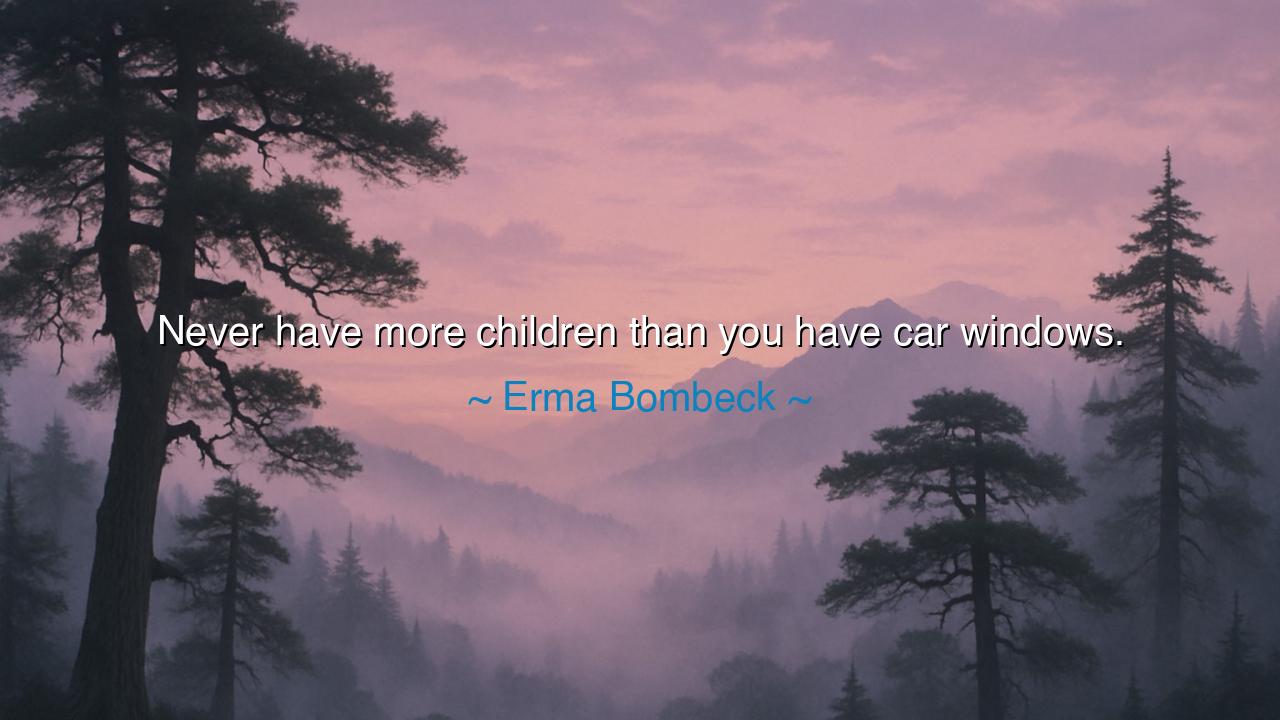
Never have more children than you have car windows.






“Never have more children than you have car windows.” Thus spoke Erma Bombeck, the gentle philosopher of the everyday, whose humor was the language of love disguised as laughter. With this witty counsel, she did not merely speak of automobiles or offspring — she spoke of balance, of the tender art of knowing one’s limits. Her jest is a parable of life itself: that joy, to remain joy, must be tempered by wisdom, and that even love, the most abundant of blessings, must be guided by measure and care.
In the ancient days, sages often wrapped truth in jest, for laughter softens the heart so that wisdom might enter. Bombeck, like them, was no mere humorist but a chronicler of human struggle — the battles fought in kitchens, in laundry rooms, in the chaos of family life. Her “car windows” are not only glass frames but symbols of the boundaries through which we glimpse both freedom and responsibility. A car with too many passengers becomes cramped, chaotic, and wearying; so too a life burdened with more than it can hold loses its joy. She reminds us that abundance without order is not blessing, but burden.
The car, that symbol of modern life and motion, carries within it the dream of progress — yet Bombeck turns it into a stage for truth. Imagine the mother behind the wheel, her children clamoring in the back seats, voices overlapping like a chorus of small tempests. Each window represents not only space, but sanity — the ability to breathe, to see, to move. Bombeck’s warning, though clothed in humor, speaks to every generation: that love must be given in proportion to one’s strength, lest care turn to exhaustion. For when the caretaker collapses, who remains to care?
Consider the story of Catherine Beecher, sister to the famed Harriet Beecher Stowe. Catherine, though never a mother herself, devoted her life to improving the domestic sphere for women of her time. She saw how the weight of endless labor and childrearing could crush the spirit, how mothers, revered yet overburdened, often lost themselves in the service of others. Like Bombeck, she sought to remind women — and indeed all humanity — that self-preservation is not selfishness, but the foundation of enduring love. A mother who honors her limits ensures that the love she gives is whole and not hollowed by fatigue.
Thus, Bombeck’s humor conceals heroism. To admit that one cannot do all things is an act of courage. The modern world, which glorifies busyness and endless giving, often forgets that to sustain others, one must first sustain oneself. The car windows, then, become a metaphor for the windows of the soul — each one a portal through which air, light, and clarity enter. Too many burdens, too many responsibilities, and those windows fog and close. The journey of life becomes stifled. Bombeck teaches that wisdom is not in endless sacrifice, but in maintaining the sacred balance between giving and being.
Her quote also speaks to the nature of contentment. In a culture that praises accumulation — of things, achievements, even relationships — she reminds us that more is not always better. A family, like a car, must move in harmony; if overloaded, it cannot travel far. Love thrives in spaces where attention can breathe. To nurture five hearts deeply is greater than to stretch one’s care so thin that none are truly held.
So the lesson, dear reader, is this: know your windows, and cherish what fits within them. Whether in family, work, or friendship, measure your commitments by the light you can still let in. Do not mistake exhaustion for virtue. Let your life be filled, not crowded; your love abundant, not scattered. Rest when you must, and laugh — as Bombeck did — at the beautiful chaos of being human.
And when the road feels long, remember her wisdom: to drive well through life, you must see clearly, breathe freely, and love wisely. For the car is your life, the windows your limits, and the passengers your heart’s greatest treasures. Keep them few enough to cherish, and your journey will be joyous and long.






AAdministratorAdministrator
Welcome, honored guests. Please leave a comment, we will respond soon